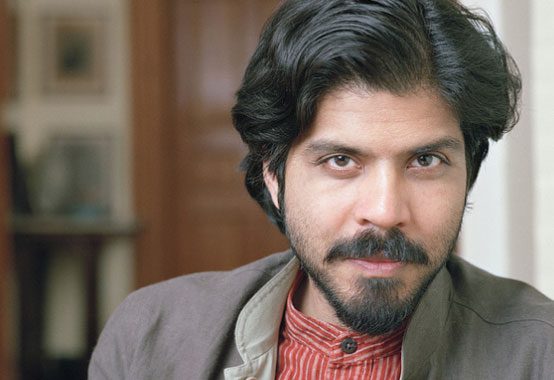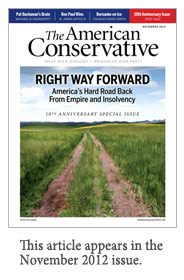Post-Colonial Prophet

Pankaj Mishra is a fascinating creature. He was born to a family of pauperized Brahmins in Jhansi, a small town in the north of India in 1969. By the age of 20, he had spent “three idle, bookish years at a provincial university in a decaying old provincial town.” Like many young men of a bookish disposition, he had little idea of what to do with himself. He harbored literary ambitions, but was uncertain how to fulfill them. Add to this an aversion to “the modern world of work and achievement … careers and jobs” and we find ourselves in the company of a distinctly brooding, melancholy character who would either beat the odds and rise to make a mark on the world of English literature or die in obscurity.
He succeeded. By 2012, Mishra had completed the journey from periphery to metropole in a most spectacular manner. Mishra writes for—and is written about in—the New York Times. He trades barbs with Harvard historian and enthusiastic Atlanticist Niall Ferguson in the London Review of Books, produces punchy polemics for the Guardian, and files long, nonfiction essays for The New York Review of Books from all over the world. He also adds much-needed color to the opinion pages of the Financial Times and Bloomberg, titillating his elite Western capitalist readership with his decidedly non-Western, non-capitalist Weltanschauung.
Mishra’s eloquence is not in doubt. But what is it about the zeitgeist that explains his rise to secular sainthood in the Anglo-American literary establishment? What is it that makes him the West’s Orientalist-in-chief?
The West, post-9/11, is a chastened and humbled beast. Its adventures in the Muslim world have ended in disaster and many of its nations face political and economic crises at home. The prevailing mood in the West is curiously reminiscent of the Weimarian pessimism of the interwar period in the early 20th century, where a population bred on the Whiggish certitudes of the Victorian era struggled to come to terms with its self-immolation in World War I. Thus, it almost welcomed the polemical pessimism of Oswald Spengler’s The Decline of the West (1918) and its cruder American cousin, Theodore Lothrop Stoddard’s The Rising Tide of Color Against White World-Supremacy (1920).
Similarly, Americans in the 21st century—unthinkingly nourished for generations on the unalloyed virtues of universal suffrage, free-market capitalism, and the self-seeking sovereign individual—cheerfully followed their political leaders into the darkest recesses of the Muslim world. The project to immanentize the American eschaton in the Middle East may not have cost as many lives as the Western civil wars popularly known as World Wars I and II, but it has created a parallel sense of shock and civilizational flux. In this environment of renewed civilizational pessimism, the West is increasingly open to critical diagnoses of its imperial overreach, particularly from eloquent outsiders.
It is in this context that Pankaj Mishra has flourished. Although Mishra is not a Westerner, and certainly no Spengler, he has eagerly embraced the narrative of Occidental decline and Oriental vitality. Concluding a recent op-ed in the New York Times, he argued, “It is the world’s newly ascendant nations and awakened peoples that will increasingly shape events in the post-Western era. America’s retrenchment is inevitable. The only question is whether it will be as protracted and violent as Europe’s mid-20th century retreat from a newly assertive Asia and Africa.”
The objective of Mishra’s new book is to articulate and synthesize the response of Asian thinkers to Western imperialism. The primary figures in this attempted synthesis are Jamal al-Din al-Afghani (1838-1897), an itinerant anti-colonial Muslim political activist of Persian extraction, and Liang Qichao (1873-1929), who according to Mishra was China’s first modern intellectual. Mishra makes it clear that this book is a work of intellectual biography, yet one expected to find, at the very least, the lineaments of a broader theory of non-Western political modernity—a way for non-Western polities to conduct themselves in a post-Western world.
Instead one is greeted with a compendium of what men of previous generations have said on the topic. This is clearly sufficient for some. Mark Mazower in the Financial Times writes, “From the Ruins of Empire retains the power to instruct and even to shock. It provides us with an exciting glimpse of the vast and still largely unexplored terrain of anti-colonial thought that shaped so much of the post-western world in which we now live.”
But only a glimpse. Mishra fails even at the comparatively modest task of surveying Indian, Islamic, and Confucian responses to the Western juggernaut, let alone weaving them into a web of common meaning and crafting a theory of non-Western political modernity from their sinews. Fired by the urge to reach a lay audience, Mishra leaves the educated reader scratching his head in incomprehension at the short shrift awarded to the thinkers of his choice. The author jumps from world-historical event to world-historical event, political thinker to political thinker, in a desperate attempt to impose order and teleology onto the chaos that characterized the East’s original responses to the blue-eyed, red-bearded men of Europe.
Mishra does make some interesting claims of his own in the chapter “Asia Remade” and in the epilogue. He is correct to highlight the world-historical nature of the rise of the West: “White men, conscious of their burden changed the world for ever … successfully exporting its ideas to the remotest corners of the world, the West also destroyed native self-confidence, causing a political, economic and social desolation that can perhaps never be relieved by modernity alone.”
Despite this, he also writes, “the dominance of the West already appears just another, surprisingly short-lived phase in the long history of empires and civilizations.” There is a paradox here. The formal dominance of the West may be at an end. However, the ideational Pandora’s box opened by the West refuses to shut. As the English philosopher John Gray observes,
Even in those non-Occidental cultures which have preserved themselves substantially intact, and which have modernized without Westernizing their social forms and structures, the impact of the revolutionary nihilism of Westernization has been to disrupt the traditional conceptions of the human relationship with the Earth, and to supplant them by humanist and Baconian instrumentalist understandings, in which nature is no more than an object of human purposes.
In adopting the secrets of the West to beat the West, the non-West has Westernized itself. The “rest” may rise to inflict humiliation on the West, but they can only do so with the ideational weaponry of the West. Isn’t the greatest victory of all that in which one has succeeded in colonizing the minds of one’s enemies, turning them into doppelgangers of oneself? The West continues to live on in the practices of the East. In that sense, it has ensured its immortality.
Mishra recognizes this contradiction. “Much of the ‘emerging’ world now stands to repeat, on an ominously larger scale, the West’s own tortured and often tragic experience of modern ‘development,’” he observes near the end of his book. The triumph of Western-style scientific instrumentalism threatens to condemn “the global environment to early destruction, and looks set to create reservoirs of nihilistic rage … among hundred of millions of have-nots—the bitter outcome of the universal triumph of Western modernity, which turns the revenge of the East into something darkly ambiguous, and all its victories truly Pyrrhic.”
These meaningful observations are the saving graces of Mishra’s book. However, there is one odd, barely noticeable claim that must be singled out for scrutiny. He writes:
We can see that the seemingly wholesale adoption of Western ideologies (Chinese communism, Japanese imperialism) did not work. Attempts at syntheses (India’s parliamentary democracy, Muslim Turkey’s secular state, China’s state capitalism) were more successful…
While I am in complete agreement with the general principle, I am unable to fathom Mishra’s inclusion of “India’s parliamentary democracy” as an example of “synthesis.” What is it about India’s Westminster form of government that is native to her political traditions? The Constitution of India reads like a document of the European Enlightenment. India may have achieved formal independence from British rule in 1947, but her intellectual subservience to Western political thought continues.
Westernization-from-above is certainly a plausible post-colonial project. (In fact, Mustafa Kemal Atatürk managed it with finer aplomb than most as he romanized the Turkish alphabet and erected a wall of separation between mosque and state.) However, to attempt such a thing while unleashing the energies of universal mass suffrage from below is to court political dissolution. In The Times of India, Mishra has mourned that at 65 years old India has lost her way. The truth is, she never had her way in the first place. “Secularism and socialism” were somebody else’s words, somebody else’s thinking. India had merely borrowed them to give herself a political voice in the age of Western dominance. The real tragedy is India’s complete inability to synthesize a native alternative to Western democratism.
What hope then for the non-West? Mishra is right to focus on China as the Occident’s most formidable challenge but he does not see the Chinese articulating a meaningful universalist response to Western ideas of politics and economy. John Gray, however, is more optimistic:
In those non-Occidental cultures which have remained substantially intact, there may nevertheless be a possibility of a recovery of their traditional conceptions, such that they might successfully integrate Western technology without thereby succumbing wholly to Western humanism and nihilism.
 This is the fundamental challenge for the non-West, and the man who lives up to it is the man who invents non-Occidental political modernity. There are signs that the Chinese have begun thinking in this direction. Eric X. Li, the Shanghai venture capitalist and polemicist, has begun articulating a non-Western conception of political modernity and Yan Xuetong, professor of International Relations at Tsinghua University has begun probing native Confucian traditions of “humane authority” to temper Chinese materialism. Similarly, Mark Lilla, a Western academic, has highlighted Chinese scholarly interest in the political theology of Carl Schmitt and Leo Strauss.
This is the fundamental challenge for the non-West, and the man who lives up to it is the man who invents non-Occidental political modernity. There are signs that the Chinese have begun thinking in this direction. Eric X. Li, the Shanghai venture capitalist and polemicist, has begun articulating a non-Western conception of political modernity and Yan Xuetong, professor of International Relations at Tsinghua University has begun probing native Confucian traditions of “humane authority” to temper Chinese materialism. Similarly, Mark Lilla, a Western academic, has highlighted Chinese scholarly interest in the political theology of Carl Schmitt and Leo Strauss.
There is great intellectual ferment in China, and Mishra’s meditation on non-Western thought would have been much improved had he focused on it. However, despite the disappointment of this book, there is no better model than Pankaj Mishra for young non-Westerners eager to carve a niche for themselves in the West’s intellectual establishment. For this reason—and because his literature is some of the finest to emerge from the Indo-English encounter—he will be worth watching; his next move should not be missed.
Vijay Vikram is a TAC editorial assistant.
Comments